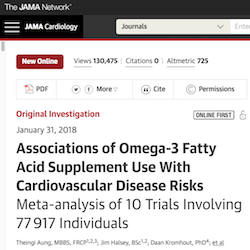Negative opinions on the conclusions continue in response to a recent Journal of the American Heart Association study, Associations of Omega-3 Fatty Acid Supplement Use with Cardiovascular Disease Risks. Jeff Bland, Ph.D. calls the JAMA fish oil study one of the most controversial in recent history.
The meta-analysis reviewed 10 large trials totaling 77,917 subjects and concluded that there is no scientific support for consumption of fish oil for heart health support. The ire among fish oil supporters was further fueled by a statement published in the New York Times: “Carefully done trials provide no support for the hypothesis that fish oil supplements help,” from Dr. Robert Clarke, a professor of epidemiology at the University of Oxford.
Clarke added fuel to the fire when he challenged The American Heart Association recommendation that people with coronary artery disease should supplement if they do not get enough omega-3’s by diet alone. Clarke said there is “no support” for the guidelines.
Experts familiar with fish oil data analysis and the history of fish oil clinical trials had a lot to say about the the way the information was presented to the media and the manner in which the data was interpreted scientifically:
-
- The data is in line with a previous study, J of Clinical Lipidology, published in Aug 2017 showing a statistically significant 8% reduction in cardiovascular deaths. ~ Global Organization for EPA and DHA Omega-3s (GOED)
- The research used “selective inclusion of data,” and “studies that employed sub-/non-therapeutic dosing,” said Alex Vasquez, DO, CN. Click on image below for a video on Dr. Vasquez’s analysis of the study.
-
Jeffrey Bland PhD, agrees with Dr. Vasquez. In this video, Bland cites the value of the Omega-3 quad index, of which only three of the 10 studies used an appropriate amount of DHA and EPA as an 1800mg/daily dose. Bland says that among those three studies, the data actually shows that with the right level of intervention there are benefits.





